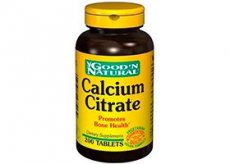Medical expert of the article
New publications
Preparations
Calcium citrate
Last reviewed: 03.07.2025

All iLive content is medically reviewed or fact checked to ensure as much factual accuracy as possible.
We have strict sourcing guidelines and only link to reputable media sites, academic research institutions and, whenever possible, medically peer reviewed studies. Note that the numbers in parentheses ([1], [2], etc.) are clickable links to these studies.
If you feel that any of our content is inaccurate, out-of-date, or otherwise questionable, please select it and press Ctrl + Enter.

Indications Calcium citrate
It is used in combination therapy and prevention of osteoporosis (idiopathic or steroid origin or during postmenopause), as well as complications of this disease (bone fractures).
To compensate for the deficiency of cholecalciferol and calcium that developed due to poor nutrition.
During the period when the body has an increased need for cholecalciferol with calcium: for pregnant and nursing mothers, as well as teenagers from 13 years of age during the stage of intensive growth.
Pharmacodynamics
A complex medicine that stabilizes the processes of phosphorus and calcium metabolism in the body. Helps to compensate for the deficiency of cholecalciferol and calcium in the body.
Calcium is a participant in the regulatory processes of impulse transmission within the nervous system, as well as muscle contractions. It is part of the blood coagulation system and helps in the formation of bone tissue, mineralization of teeth, and improves heart function.
Cholecalciferol affects the metabolism of phosphorus with calcium, increases intestinal absorption of calcium, as well as renal reabsorption of phosphorus. 1 tablet contains 10-15% of the body's daily requirement for the element Ca.
Dosing and administration
The drug is taken in the amount of 1-2 tablets 2-3 times a day (or an individual regimen is prescribed, depending on the clinical picture). It is necessary to swallow the tablet and wash it down with liquid.
The duration of therapy depends on the severity and nature of the disease. Usually it lasts 1 month, and if there are indications, the course can be continued as usual after a 1-week break. Such breaks (7-day) should be taken after every 4 weeks of therapy.
It is allowed to take no more than 6 tablets per day.
Contraindications
Main contraindications:
- intolerance to the components of the drug;
- hypercalciuria or hypercalcemia (this also includes diseases associated with prolonged immobility and hyperparathyroidism of both primary and secondary types);
- sarcoidosis;
- severe degree of renal failure;
- urolithiasis;
- osteoporosis caused by prolonged immobility;
- children under 13 years of age.
Side effects Calcium citrate
Often, taking Calcium Citrate causes hypercalcemia and kidney dysfunction in the case of long-term use of large doses of the drug. Allergy symptoms may also be noted. Occasionally, manifestations of dyspepsia develop - diarrhea or constipation, abdominal pain and nausea.
Overdose
Chronic or acute poisoning can cause hypercalcemia associated with cholecalciferol intolerance. Toxic effects are observed when taking more than a hundred tablets per day.
Signs include: development of anorexia, vomiting, dizziness, constipation, nausea, myalgia and headaches. Heartburn, kidney problems, a feeling of weakness, diarrhea, crystalluria and increased blood pressure are also noted. Loss of consciousness and coma may develop.
If such symptoms develop, the drug should be discontinued and the victim should be given plenty of fluids to drink. He should also eat food that contains a minimum of calcium. If hypercalcemia is observed to a significant degree, an intravenous infusion of saline solution should be administered, and in addition, furosemide should be administered and a hemodialysis procedure should be performed.
 [ 31 ]
[ 31 ]
Interactions with other drugs
Calcium can increase the absorption of tetracyclines, iron medications and fluoride-containing products, which is why it is necessary to use Calcium Citrate at least 3 hours before or 3 hours after using the above medications.
In people who take diuretic drugs from the thiazide category together with the drug, hypercalcemia may develop occasionally.
The drug weakens the properties of aluminum-containing antacids.
Special instructions
Reviews
Calcium citrate is an effective vitamin and mineral complex that helps to replenish the deficiency of nutrients in the body. According to reviews, it helps during pregnancy, as well as a preventive measure against osteoporosis. Being an effective source of calcium, it improves the condition of teeth, hair and nails. It also works well for problems with joint function, making pain in them rarer and less pronounced.
Shelf life
Calcium citrate is permitted to be used for 2 years from the date of release of the drug.
 [ 42 ]
[ 42 ]
Attention!
To simplify the perception of information, this instruction for use of the drug "Calcium citrate" translated and presented in a special form on the basis of the official instructions for medical use of the drug. Before use read the annotation that came directly to medicines.
Description provided for informational purposes and is not a guide to self-healing. The need for this drug, the purpose of the treatment regimen, methods and dose of the drug is determined solely by the attending physician. Self-medication is dangerous for your health.

